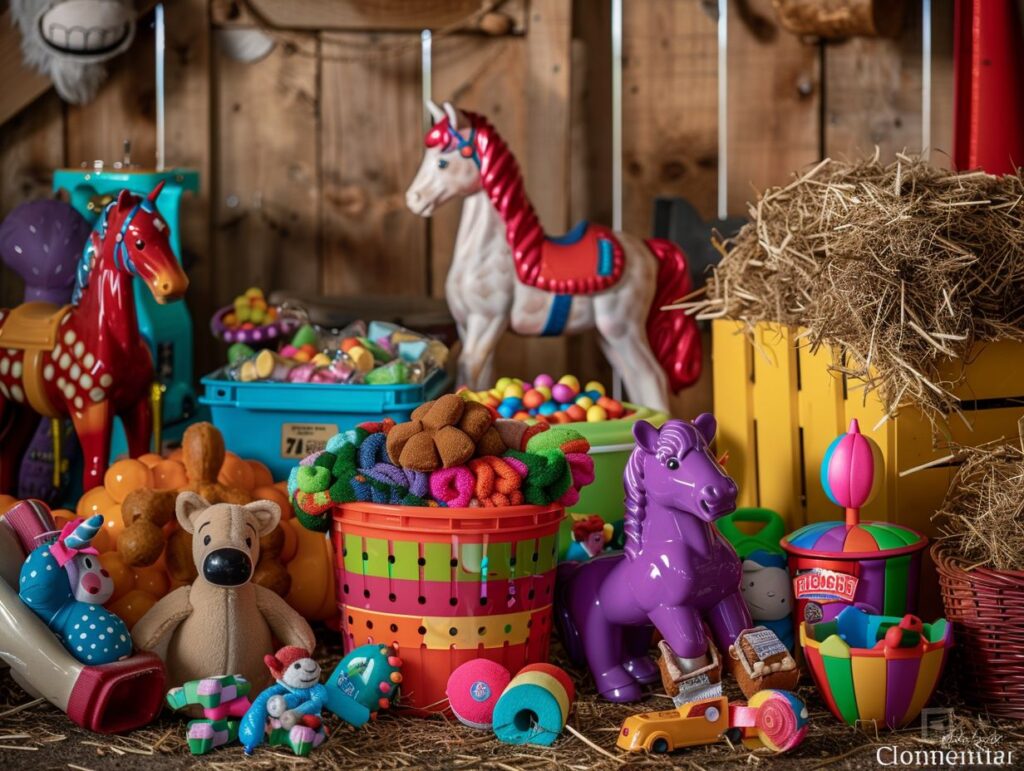Hindgut ulcers in horses can be sneaky yet painful, really impacting their overall health and performance. I’ve learned that understanding the symptoms is super important for catching them early because, if left untreated, those ulcers can cause a world of discomfort.
These are the signs to look out for, along with treatment options that really work; like medications, dietary changes, and even some alternative therapies.
Plus, we’ll cover practical ways to help keep your horse’s digestive health in check. It’s all about having the right information to keep your equine companion happy and thriving.
Hindgut Ulcers in Horses
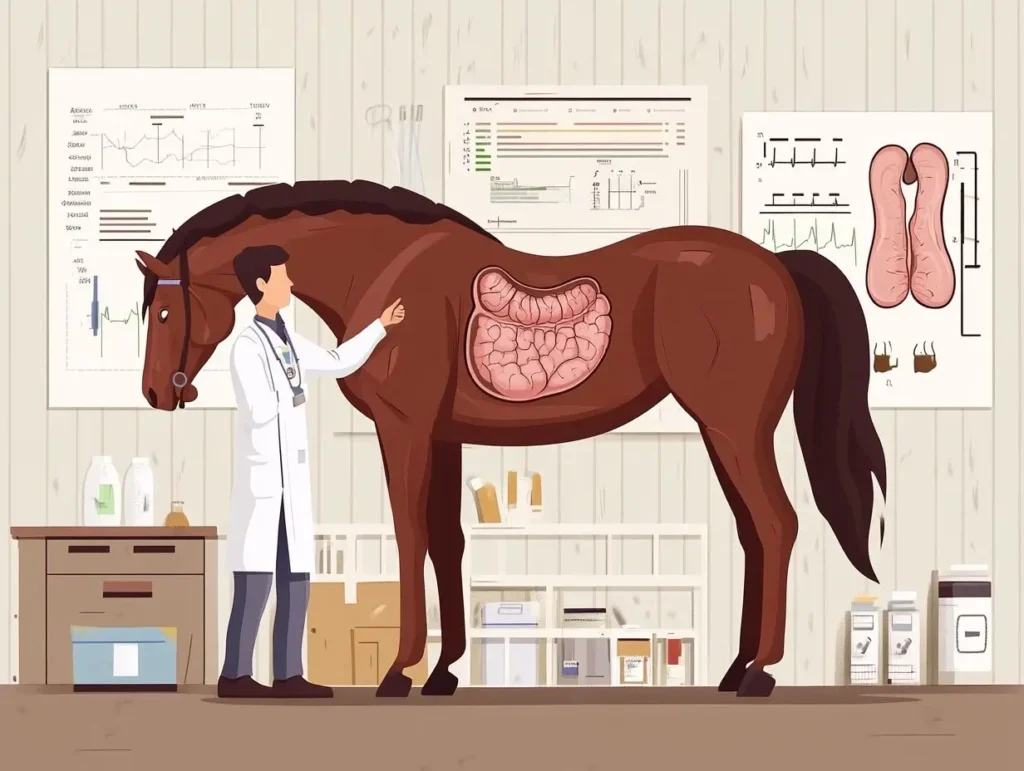
Hindgut ulcers in horses are something I really pay attention to when it comes to horse health. They can cause some serious digestive issues and even affect performance.
These ulcers can pop up in the large intestine, and if not managed properly could lead to some big complications. It’s super important to understand how these hindgut ulcers form, what might cause them, and how equine anatomy plays a role in these digestive problems.
With the right preventive care and treatment options, you can really help boost your horses’ gut health and overall well-being.
What is Equine Hindgut Ulcers?
Hindgut ulcers can occur due to a decrease in pH levels of a horses’ colon caused by excess levels of lactic acid. Not properly foraging may result in damage to the mucosal lining compromising their gut health.
Understanding the Condition
Understanding hindgut ulcers is really important for keeping my horse healthy because these issues can come from various problems like inflammatory bowel disease or poor dietary habits.
I’ve noticed that these ulcers often pop up when horses go too long without forage, which messes with their gut microbiota and raises acidity in the cecum. This acidic environment can cause discomfort and pain, leading to a whole bunch of physiological changes that might mess with nutrient absorption and overall well-being.
As equine research keeps growing, it’s revealing how certain dietary factors like high-starch feeds or not enough fiber can contribute to ulcer formation. By getting a better grasp on these relationships, you can work with your veterinarian to come up with smarter feeding strategies and management practices.
Symptoms of Hindgut Ulcers
Just know that recognizing the symptoms of hindgut ulcers is important for horse owners and equine veterinarians. Catching these issues early can really lead to more effective treatment options and better outcomes for our horses.
Recognizing Common Signs
Common signs of hindgut ulcers can really show up in changes to a horse’s nutrition, hydration levels, and even their behavior.
For example, your horse might have a fluctuating appetite, which can lead to unexpected weight loss or gain. That can make managing their weight a real challenge. You can also tell if they’re stressed by signs like increased irritability or being more sensitive to things around them, which usually means they’re uncomfortable.
Keeping your horse properly hydrated is really important because dehydration can make those symptoms worse. I find that regular check-ins with the vet help me keep tabs on these signs, ensuring that I can intervene in time if needed.
This whole approach helps better understand and manage a horse’s overall health, leading to improved well-being and performance. It’s important that you know the early signs of equine hindgut for accurate diagosis.
Treatment Options for Hindgut Ulcers
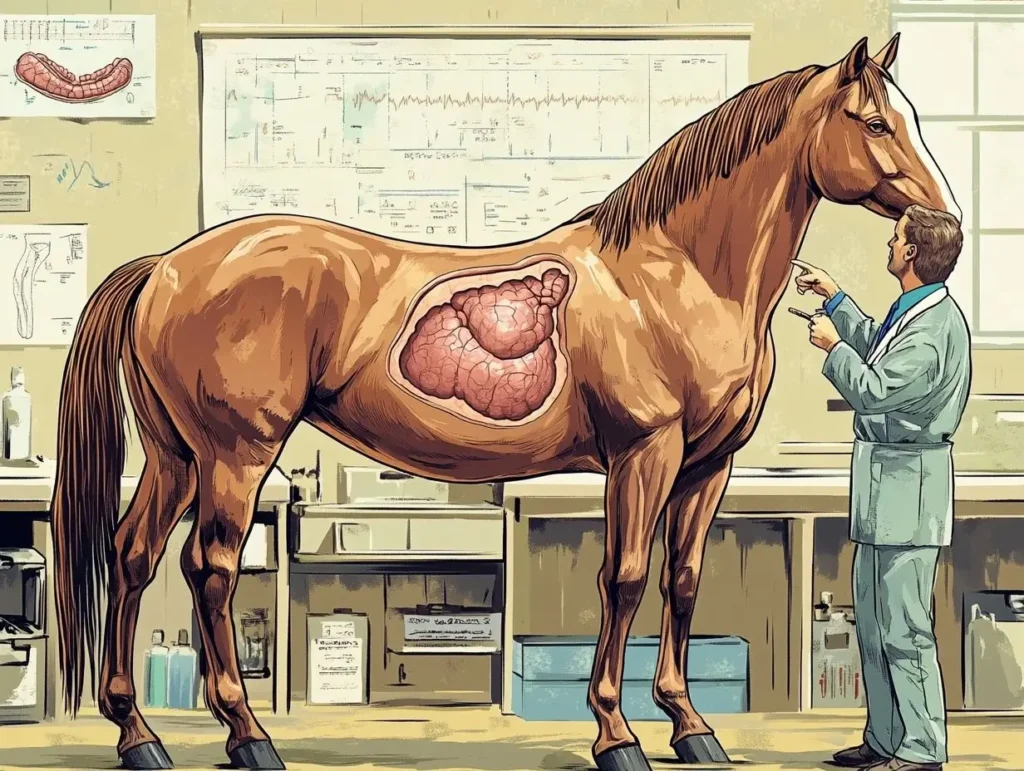
When I think about treating hindgut ulcers in horses, I realize there are quite a few options out there. I’ve got everything from medications to dietary changes and even some holistic approaches that can really help support digestive health.
It’s all about finding the right mix that works for each horse.
Medications and Supplements for Hindgut Ulcers
Using the right medications and equine supplements has been a game changer in managing hindgut ulcers in my horse. It’s amazing how much they can help promote gut health and ease those pesky ulcer symptoms.
To get the best results, I’ve learned it’s important to know about the different types of medications out there, like proton pump inhibitors and antacids. These specifically target gastric acid levels and really help the healing process. They work by neutralizing excess acidity and providing a buffer for those delicate tissues in the gastrointestinal tract.
I’ve also started incorporating ExcelEQ ProElite and equine probiotics into the mix, which really supports digestive balance by encouraging the growth of beneficial bacteria. This not only enhances nutrient absorption but also helps reduce inflammation.
I can’t stress enough how crucial it is to maintain proper hydration in any treatment plan. It aids digestion and helps flush out toxins, which ultimately boosts my horse’s overall well-being.
Dietary Changes
Making dietary changes is key when it comes to managing hindgut ulcers. I’ve found that proper diet management can really impact a horse’s gut health and overall performance.
I’ve learned that ensuring an adequate intake of fiber is super important. It promotes digestive health and helps keep that gut microbiome balanced. The quality of forage is essential; nutrient-rich hay and grasses provide the vitamins and minerals that can really aid in the healing process.
If I have a horse with this issue, I know it’s crucial to talk to a veterinarian about any necessary dietary restrictions, like avoiding high-starch feeds that might make ulcer symptoms worse. By sticking to a consistent feeding schedule and focusing on fiber-based nutrition, you can really help improve a horse’s recovery and well-being.
Plus, keeping up with nutrition education helps make informed choices that prioritize gut health.
Alternative Therapies
I find that alternative therapies, like herbal remedies and holistic approaches, can really complement traditional treatments for hindgut ulcers and offer some extra support for managing equine health.
These methods are great because they focus on the horse’s overall well-being instead of just masking symptoms. I’ve seen how techniques like acupuncture, dietary adjustments, and probiotics can enhance gut health and improve digestion, helping to create a more resilient digestive system.
It’s so important to educate horse owners about these alternatives, as it gives them power to make informed choices that suit their animal’s specific needs. I really believe that when veterinarians and horse owners work together, it can lead to better management strategies and ultimately, healthier horses dealing with these issues.
Surgical Intervention
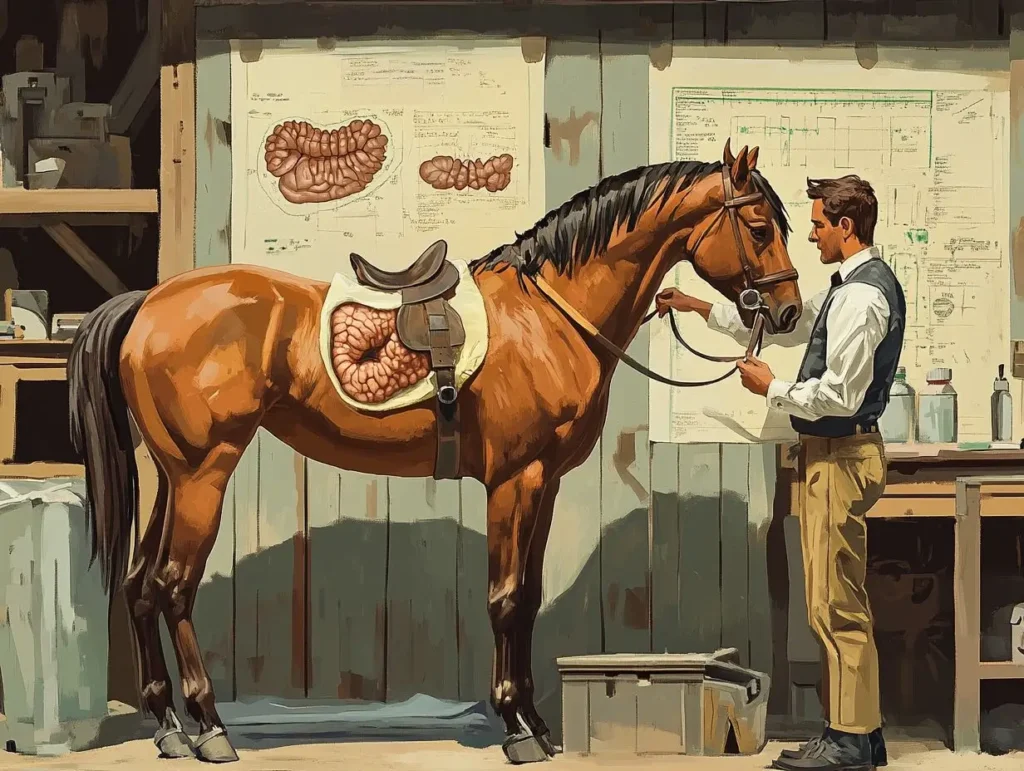
In severe cases of hindgut ulcers, surgery might be on the table. So it’s really important for horse owners like me to reach out to equine specialists for the best advice on what to do next.
When you notice distressing symptoms, like significant weight loss, frequent colic episodes, or changes in behavior; getting a veterinary assessment right away is crucial. The vets will weigh the pros and cons of surgery, which can come with some serious risks, including infection and complications from anesthesia.
You can’t underestimate the importance of emergency care; timely intervention is key to getting your horse back to good health. Prioritizing equine welfare is essential, and any decisions about surgery need to focus on the well-being and quality of life of the horse. It’s all about making sure that any surgical options fit within the overall care plan.
Preventing Hindgut Ulcers
I’ve found that preventing hindgut ulcers is way more effective than trying to treat them after they pop up which is why we use Excel ProElite. It really takes a well-rounded approach that covers everything from preventive care to taking good care of my horse and understanding their nutritional needs.
Best Practices for Equine Digestive Health
Implementing best practices for equine digestive health is so important for preventing hindgut ulcers and making sure our horses are happy and healthy, especially in rescue situations.
I’ve found that taking proactive steps, like providing a balanced diet that’s rich in forage and using smart feeding strategies, can really boost their digestive health. Having access to well-managed pastures not only encourages them to graze naturally but also helps maintain a healthy weight and keeps them hydrated.
I also like to tap into community resources, like local veterinary services and equine nutritionists, to get personalized guidance. This way, I can ensure that each horse’s unique needs are met effectively.
Regularly monitoring and adjusting these practices goes a long way in creating a healthier gut environment, which helps them stay resilient against digestive disorders.
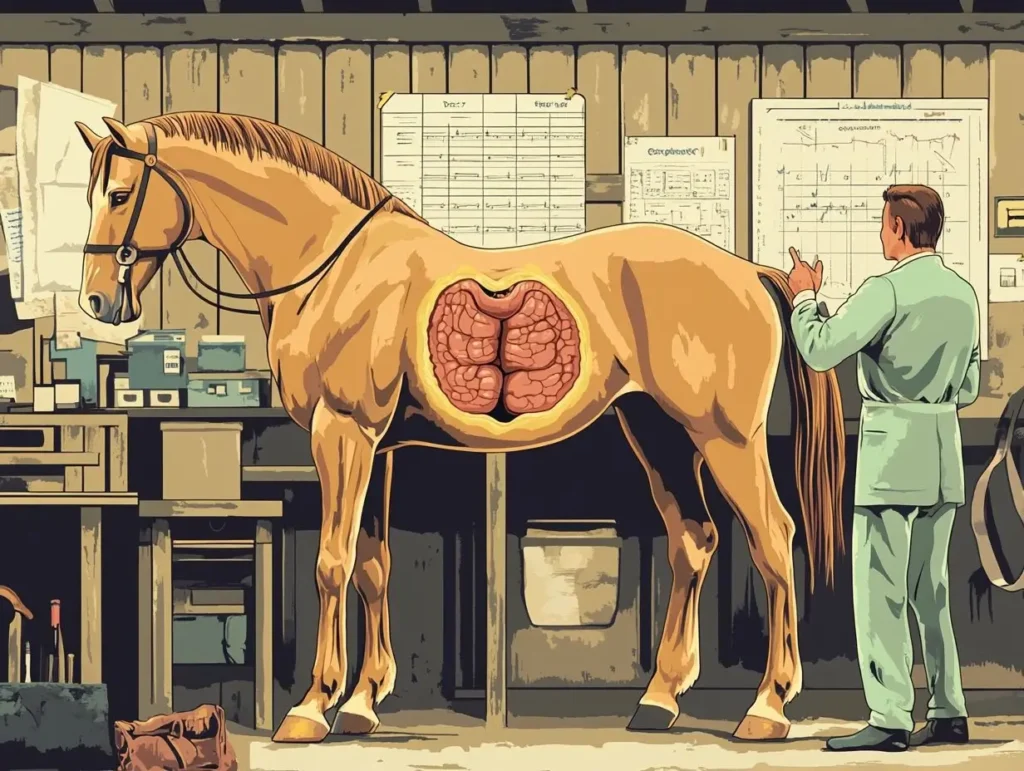
Frequently Asked Questions
What are hindgut ulcers in horses?
Hindgut ulcers are lesions or sores that develop in the hindgut of a horse, specifically in the colon and cecum. They can cause discomfort, pain, and digestive issues in horses.
What are the symptoms of hindgut ulcers in horses?
The symptoms of hindgut ulcers in horses may vary, but some common signs include weight loss, decreased appetite, poor coat condition, diarrhea, and colic. You may also notice changes in behavior, such as increased irritability or reluctance to work.
How are hindgut ulcers in horses diagnosed?
Hindgut ulcers can be diagnosed through a combination of physical examination, endoscopy, and fecal testing. Your veterinarian may also perform a rectal exam to check for any abnormalities in the hindgut.
What are the causes of hindgut ulcers in horses?
Hindgut ulcers can be caused by a variety of factors, including stress, diet changes, and prolonged use of non-steroidal anti-inflammatory drugs (NSAIDs). They can also be a result of bacterial or parasitic infections in the hindgut.
How can I treat hindgut ulcers in horses?
There are several ways to treat hindgut ulcers in horses, including making dietary changes, using equine supplements, reducing stress levels, and proper medications. It is important to work closely with your veterinarian to develop a treatment plan that is tailored to your horse’s specific needs.
Can hindgut ulcers in horses be prevented?
While hindgut ulcers can be difficult to prevent entirely, there are steps you can take to reduce the risk of your horse developing them. These include maintaining a consistent and healthy diet, providing plenty of turnout and exercise, and managing stress levels. Regular check-ups with your veterinarian can also help catch any potential issues early on.
